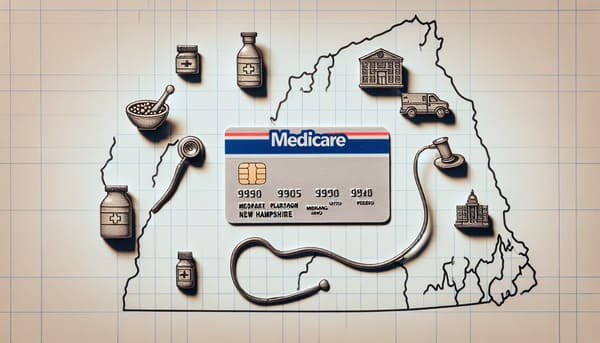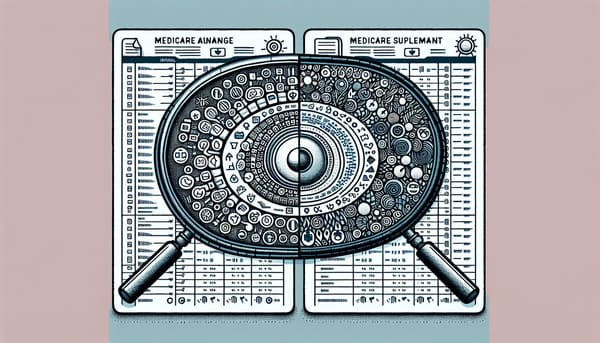
by Russell Noga | Updated March 27th, 2024
If you’re searching for Medicare Supplement plans in New Hampshire, 2025 quick and precise information is key. This guide cuts through the complexity, comparing Medicare Supplement Plans in New Hampshire for 2025 and rates directly so you can confidently choose the coverage that fits your needs. Discover the essential details about each plan’s benefits and costs without the fluff, putting you on the fast track to a well-informed decision.
Key Takeaways
- Medicare Supplement plans in New Hampshire, also known as Medigap, are insurance plans that cover costs not covered by Original Medicare, with a variety of plans available offering different levels of coverage.
- Eligibility for Medicare Supplement plans requires being 65 or older, a U.S. citizen for at least five years, or qualifying through disability, with specific conditions applying to those under 65 who can enroll without excessive premium markups.
- Medicare Advantage plans differ from Medicare Supplement plans in coverage, costs, and network restrictions, with Advantage plans often offering additional benefits and Medigap plans providing coverage for out-of-pocket costs associated with Original Medicare.
Compare 2025 Plans & Rates
Enter Zip Code
Understanding Medicare Supplement Plans in New Hampshire

Medicare Supplement plans in New Hampshire, also known as Medigap plans, are designed to bridge the gap left by Original Medicare. These plans cover costs that Original Medicare does not, such as Medicare deductibles, coinsurance, and certain hospital costs. Enrolling in a Medicare Supplement plan in New Hampshire provides the freedom to visit any doctor or hospital that accepts Medicare, thus broadening your healthcare provider options.
Providing financial security and peace of mind, these plans guarantee benefits as long as enrollees consistently pay their premiums. But it’s not a one-size-fits-all situation. New Hampshire offers a variety of Medicare Supplement plans, each with distinct coverage levels. Curious to know more about them? Let’s examine them further.
Types of Medicare Supplement Plans
New Hampshire offers several Medicare Supplement plans, but some stand out because of their popularity and comprehensive coverage. Take Medigap Plan F, for example. As the most subscribed Medicare Supplement plan in New Hampshire, it boasts 44,707 enrollees. Then, we have Medigap Plan N, which follows closely with 23,459 beneficiaries.
But the popularity contest doesn’t stop there. Medigap Plan G is another favorite, preferred for its comprehensive healthcare expense coverage, with 10,992 beneficiaries in New Hampshire. And let’s not forget Medigap Plan C, chosen by 2,038 beneficiaries, covering almost all healthcare costs except for Medicare Part B excess charges.
While knowing what these plans offer is essential, understanding the eligibility criteria to manage access and regain access, if needed, is the next key step.
Eligibility Criteria
Eligibility for Medicare Supplement plans typically requires being at least 65 years old and a U.S. citizen for at least five years. But what if you’re under 65? Does that mean you’re ineligible? Not necessarily. Individuals under the age of 65 may qualify for Medicare and subsequently, for Medicare Supplement plans if they have:
- disabilities
- end-stage renal disease (ESRD) after a waiting period
- Amyotrophic Lateral Sclerosis (ALS), provided they receive Social Security Disability Insurance (SSDI) for at least 24 months.
Moreover, New Hampshire offers an added advantage. Here, residents under the age of 65 who qualify for Medicare due to a disability have access to Medicare Supplement plans without an extreme premium markup, which is not the case in some other states. However, to be eligible, individuals must be actively enrolled in both Medicare Part A and Part B. Notably, the premiums for Medicare Supplement plans for individuals under 65 are significantly higher, reflecting the higher medical costs typically associated with younger beneficiaries.
Having covered the basics, we can now delve deeper into these plans, comparing them on various factors for the WordPress user.
Comparing Medicare Supplement Plans in New Hampshire 2025

It is essential to evaluate the Medicare Supplement plans in New Hampshire on their coverage, premiums, and provider networks. Why? Because these plans offer different benefits and thus, understanding which one meets your healthcare needs becomes essential. Premiums for these plans can vary significantly based on factors such as the plan type, the company offering the plan, the beneficiary’s age, and medical underwriting. Hence, comparing costs becomes a must.
Provider networks also play a key role. While some Medicare Supplement plans offer broader access to doctors and facilities, others may have more limited options. This can significantly influence a beneficiary’s flexibility and choice.
Plan Benefits
Plan benefits are a key factor when comparing Medicare Supplement plans. These benefits vary among the different plans, with each catering to specific healthcare needs. So, it’s important to draw comparisons and contrasts among these benefits to identify the plan that offers the most comprehensive coverage tailored to your specific healthcare needs.
Whether it’s health coverage for specialist visits, hospital stays, or even prescription drugs, understanding what each plan offers can help you make an informed decision. After all, choosing the right plan can significantly impact your healthcare journey, ensuring that you receive the best possible care without worrying about out-of-pocket costs.
Premiums and Costs
Premiums and costs are a significant consideration when choosing a Medicare Supplement plan. These costs can vary significantly based on several factors, including:
- The plan type
- The company offering the plan
- The beneficiary’s age
- Medical underwriting
For instance, premium rates for Plan G and Plan N are typically less expensive than Plan F, and premiums also differ depending on the age of the beneficiary.
Moreover, certain companies, like Harvard Pilgrim, offer the following benefits:
- Guarantee that premium rates will not change for 12 months from the member’s initial enrollment date
- Provides consistency and predictability in billing
- Allows you to plan your finances better and ensures that you don’t encounter any unexpected costs.
Provider Networks
Provider networks play a crucial role in making the right choice for your Medicare Supplement plan. These plans provide beneficiaries with the flexibility to see any provider that accepts Medicare, without the need to navigate provider networks. This means you have the convenience of going to any doctor or hospital that accepts Medicare, avoiding network restrictions.
However, Medicare Advantage plans in New Hampshire often have network restrictions, which can limit the choice of doctors and hospitals to those within the plan’s network for non-emergency care. On the other hand, Medicare Advantage PPO plans provide the flexibility to access out-of-network care without referrals, offering an advantage for New Hampshire beneficiaries seeking care from specialists and facilities outside of the network.
Medicare Advantage vs. Medicare Supplement Plans

When deciding on the right coverage, beneficiaries must choose between enrolling in a Medicare Advantage plan or a Medicare Supplement plan, as having both simultaneously is prohibited. The choice between the two boils down to personal preference and specific healthcare needs. Both have their advantages and considerations and understanding these can help you make an informed decision.
The comparison between these two types of plans involves analyzing their coverage differences, cost considerations, and enrollment periods. Let’s delve into these areas for a more comprehensive understanding of the differences between Medicare Advantage and Medicare Supplement plans.
Coverage Differences
The primary difference between Medicare Supplement and Medicare Advantage plans lies in their coverage. Medicare Supplement (Medigap) plans help cover out-of-pocket costs not paid by Original Medicare, such as copayments, coinsurance, and deductibles, which are often referred to as Medicare Supplement coverage. On the other hand, Medicare Advantage plans may offer additional benefits like dental, vision, and fitness programs, not included in Original Medicare.
In addition to offering extra benefits, Medicare Advantage plans are required to provide all medically necessary services covered by Original Medicare. Therefore, the choice between the two comes down to your personal healthcare needs and preferences.
Cost Considerations
Cost is a major factor when choosing between Medicare Advantage and Medicare Supplement plans. Both monthly premiums and the overall potential out-of-pocket costs need to be considered. While Medicare Advantage plans often have a $0 premium, they still require the payment of the Medicare Part B premium and may incorporate plan-specific premiums or additional costs.
On the other hand, Medicare Supplement plans can have monthly premiums that range from $150 to $200, in addition to the Medicare Part B premium. However, enrollees of Medicare Supplement plans benefit from more predictable out-of-pocket costs as these plans help in paying for deductibles, coinsurance, and copays.
Enrollment Periods
Enrollment periods for Medicare Advantage and Medicare Supplement plans vary, with specific windows for initial enrollment, open enrollment, and special enrollment periods. Medicare Advantage plans can be enrolled during the Initial Enrollment Period around the age of 65, the Annual Open Enrollment Period from October 15 to December 7, and the Medicare Advantage Open Enrollment Period from January 1 to March 31.
On the other hand, Medicare Supplement plans offer a six-month open enrollment period starting the first day of the month in which an individual turns 65 or older and is enrolled in Medicare Part B, allowing enrolment without medical underwriting or exclusions for pre-existing conditions. Once the initial six-month enrollment period for Medicare Supplement plans lapses, insurance companies may require medical underwriting, deny coverage, or charge higher premiums based on health conditions, pending special circumstances, or state regulations.
Compare Medicare Plans & Rates in Your Area
Prescription Drug Coverage Options

Prescription drug coverage is a significant aspect of Medicare plans. In New Hampshire, beneficiaries can choose between standalone Part D plans or Medicare Advantage plans that include prescription drug coverage. Standalone Part D plans offer comprehensive medication and vaccine coverage, low copays, and competitive premiums, and they utilize a national pharmacy network. As of 2023, New Hampshire Medicare beneficiaries have access to 24 Part D prescription drug plans.
But that’s not all. If you’re looking for an all-in-one solution for your healthcare and medication coverage, Medicare Advantage plans with prescription drug coverage might be right for you. Let’s look more closely at these two options.
Standalone Part D Plans
Standalone Part D plans are essential for Medicare Supplement plan enrollees since these Supplement plans do not include prescription drug coverage; beneficiaries need to purchase a Part D plan separately to cover medication costs. In New Hampshire, Anthem offers two standalone Part D plans – Anthem MediBlue Rx Standard and Anthem MediBlue Rx Plus, with the former offering a $0 annual deductible for tiers 1 and 2 drugs and a $545 deductible for higher tiers, and the latter offering a $0 deductible across all tiers.
Part D plans use a tiered formulary system, with most plans including at least two drugs per drug category and offering lower copays for preferred generic drugs in the initial coverage phase, ensuring beneficiaries have access to necessary medications. The coverage for prescription drugs under Part D includes three phases:
- Initial coverage phase: This phase begins after plan deductibles are met and continues until combined spending reaches $4,660.
- Coverage gap phase: Once the combined spending reaches $4,660, the coverage gap phase begins. During this phase, beneficiaries may have to pay a higher percentage of the cost of their medications.
- Catastrophic coverage phase: When out-of-pocket expenses hit $7,400, the catastrophic coverage phase is triggered. During this phase, beneficiaries receive reduced costs for the rest of the year.
These phases ensure that beneficiaries have access to affordable medications throughout the year, even when they may be temporarily limited, in line with the goals of the Affordable Care Act.
Medicare Advantage Plans with Prescription Drug Coverage
Medicare Advantage plans in New Hampshire incorporate the following benefits in a unified plan:
- Part D prescription drug benefits
- Hospital services
- Medical services
- Dental services
- Vision services
- Hearing services
Beneficiaries often choose Medicare Advantage with a Medicare Part D plan for the ease of managing their healthcare needs and prescriptions together. By merging prescription drug coverage with other Medicare benefits, Medicare Advantage plans may offer a more economical choice for New Hampshire residents.
Anthem provides various Medicare Advantage plan types such as HMOs and PPOs, which often encompass prescription drug, dental, vision, and hearing benefits, with diverse premium costs, copays, and deductibles to meet different budgets and health requirements.
Navigating the Special Enrollment Period

If you are currently looking to switch Medicare Supplement plans you may do so outside the open enrollment period. However, switching Medicare Supplement plans may likely involve medical underwriting, potentially leading to the denial of coverage or higher premiums based on health status.
Financial Assistance Programs
Financial assistance programs in New Hampshire provide substantial help to beneficiaries. The Medicare Beneficiaries Savings Program aids low-income elderly or disabled individuals with costs related to Medicare, such as premiums and deductibles. Furthermore, through the Qualified Medicare Beneficiaries (QMB) Program, eligible individuals receive financial assistance for Medicare Part A and B premiums, late enrollment penalties, deductibles, and coinsurance expenses.
But that’s not all. There are other assistance programs like Medicaid and Medicare Savings Programs, as well as the State Health Insurance Assistance Program (SHIP) that offer significant help. Let’s take a closer look at these programs.
Medicaid and Medicare Savings Programs
New Hampshire offers specific Medicare Savings Programs such as the QMB Program for assistance with Part A costs, SLMB and SLMB135 for help with Part B premiums and late enrollment penalties, and QDWI for assistance in paying Part A premiums for disabled working individuals. Enrollment requirements for these programs include U.S. citizenship or eligible immigration status, state residency, having a Social Security Number, and investigating all possible sources of income.
Financial eligibility for these programs is determined by both income and resources, with eligibility to deduct certain expenses from income and disregard particular assets like one’s primary residence, vehicle, and burial plots. These programs provide significant assistance to beneficiaries, making healthcare more affordable.
State Health Insurance Assistance Program (SHIP)
New Hampshire’s State Health Insurance Assistance Program (SHIP) is a godsend, offering free, personalized counseling and assistance to Medicare beneficiaries and their families. SHIP’s mission is to simplify the process of understanding Medicare for beneficiaries by providing unbiased guidance on coverage and plan options. This program’s effectiveness is bolstered by a network of trained volunteers who annually help thousands of Medicare beneficiaries with their needs.
Summary
Through this journey, we’ve explored the universe of Medicare Supplement plans in New Hampshire, their types, eligibility criteria, and how to compare them. We’ve also examined the differences between these plans and Medicare Advantage plans, along with options for prescription drug coverage. We’ve navigated the special enrollment period and delved into various financial assistance programs. By understanding these elements, you can make informed decisions and choose the right coverage that suits your healthcare needs. Remember, the best healthcare plan is the one that caters to your individual health requirements. So, choose wisely, and here’s to a healthy future!
Compare 2025 Plans & Rates
Enter Zip Code
Frequently Asked Questions
Are Medicare supplement plans being phased out?
No, only Medicare Supplement Plan F has been phased out starting January 1, 2020, but current holders can keep their plan indefinitely. However, those eligible for Medicare after that date won’t be able to purchase Plan F.
What is the most popular supplement insurance with Medicare?
The most popular supplement insurance with Medicare is Plan F. Plan G and Plan N are also popular options, but Plan F is the most comprehensive and widely chosen by Medicare Supplement enrollees. For people new to Medicare, Plan G is by far the most popular plan.
What happens to my Medigap plan if I move to another state?
You should be able to keep the same Medigap plan and insurance company despite your change of address, as long as you still have Original Medicare. If you want to switch to a different Medigap policy, you should check with the Medigap insurance company for your options.
What are the most popular Medicare Supplement plans in New Hampshire?
The most popular Medicare Supplement plans in New Hampshire are Plan F, Plan N, Plan G, and Plan C, each offering different levels of coverage. Consider these options when choosing a plan.
Speak to the Professionals about Medigap Plans and Original Medicare
If you find understanding the benefits involved with Original Medicare and Medigap Plans challenging, you’re not alone. Whether it’s a Medigap plan, or you want to know more about Medicare Supplement Plans New Hampshire in 2025, we can help. Call our team at 1-888-891-0229 for a free consultation or complete the contact form on this site, and an expert will call you back at a convenient time.
We have decades of experience advising our clients on the complexities of Medicare and Medigap plans, the benefits, cost and deductibles. We’ll ensure you get the best rate in your state and advice you can trust.



